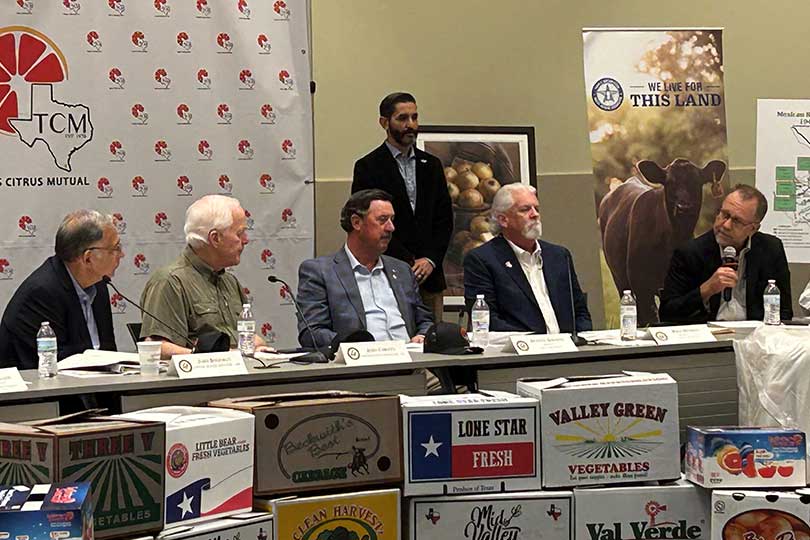By Julie Tomascik
Editor
Farmers and ranchers told U.S. Sen. John Cornyn that Congress must act now on the water crisis in the Rio Grande Valley before the situation becomes even more dire.
Cornyn and U.S. Sen. John Boozman (R-Ark.), the Senate Agriculture Committee’s ranking member, hosted a roundtable discussion with agricultural stakeholders in the Valley on Aug. 27. The lawmakers heard about the need for a modernized farm bill and the intensifying water crisis.
“Unfortunately, the farm bill and the Mexico water debt are political footballs getting tossed back and forth in Washington, D.C. between the two parties,” said Brian Jones, a fourth-generation Valley farmer and Texas Farm Bureau (TFB) District 13 state director. “I think sometimes those in D.C. forget that we, the farmers, are that football. We’re tired of being tossed and punted, and we need help now.”
Jones and other local farmers expressed concerns regarding the lack of water and how they are being impacted.
“My farm is 100% irrigated, or it’s supposed to be,” Jones said. “I just harvested the 38th crop of my career and never before in those 38 years have I never had irrigation water for my farm.”
A lack of rainfall and ongoing drought conditions have only been exacerbated by Mexico’s failure to uphold its water delivery obligations under the 1944 Water Treaty.
“This isn’t because of a lack of rainfall, or a drought or a well went dry,” Jones said. “This is because Mexico hasn’t delivered water they owe us, and our U.S. government won’t apply pressure to make Mexico deliver.”
The consequences of the water shortage are severe.
The Rio Grande Valley lost the state’s only sugar mill, and it’s losing citrus and vegetable acres.
And farmers themselves are on the brink.
“We need help now. We need our water that’s owed to us,” Jones said. “We need an updated farm bill with updated reference prices, and we need crop insurance that works for us when, through no fault of the farmer, we don’t have irrigation water.”
While some farmers, like Jones, may be able to weather the situation for another year, it’s not sustainable.
“Unfortunately, many farmers in the RGV can’t withstand these water and economic pressures this year and are wondering how to pay back this year’s bank note and how to get financing for next year,” Jones said. “We’re in a crisis. We’re in a disaster, and it’s a disaster being propelled by the U.S. government not standing up for its farmers in the RGV.”
A growing impact
The lack of water trickles down to the local economy.
Jones told the senators he’s had to lay off employees and cut hours for others.
The sugar mill closure led to a loss of about 500 jobs, and more job losses will come as farmers cut back on planted acres.
A Center for North American Studies report released earlier this year showed just how substantial economic losses would be at the state level.
The report estimated the economic impact of the complete lack of irrigation water for crop production in the Lower Rio Grande Valley this year would be about $495.8 million in direct revenue loss. That would mean an estimated total loss in economic output of $993.2 million, as well as a loss of over 8,000 jobs.
The crops grown in the Valley mostly affected by the irrigation water shortages include grain sorghum, cotton, corn, vegetables and citrus.
Water treaty details
Under the 1944 Water Treaty, the U.S. is required to send 1.5 million acre-feet of water from the Colorado River to Mexico over a five-year period.
In exchange, Mexico is obligated to send 1.75 million acre-feet of water from its tributaries to the U.S. via the Rio Grande within the same five-year timeframe.
But Mexico has fallen short on its deliveries in nearly every cycle since 1997, and the country currently owes the U.S. and South Texas more than 900,000 acre-feet.
Mexico has until October 2025 to fulfill its obligations under the current five-year cycle.
Texas Farm Bureau’s efforts
In addition to Jones, Texas Farm Bureau (TFB) President Russell Boening and Hidalgo County Farm Bureau President Isaac Sulemana were in attendance at the roundtable.
The water crisis is a priority issue for TFB, the state’s largest general farm and ranch organization.
TFB has supported legislation introduced in Congress to force Mexico to comply with the treaty.
TFB has also coordinated a meeting between Rio Grande Valley farmers and the International Boundary and Water Commission, U.S. Department of State, National Security Council, U.S. Department of Agriculture, U.S. Bureau of Reclamation and White House staff to discuss the ongoing issue.


Leave A Comment